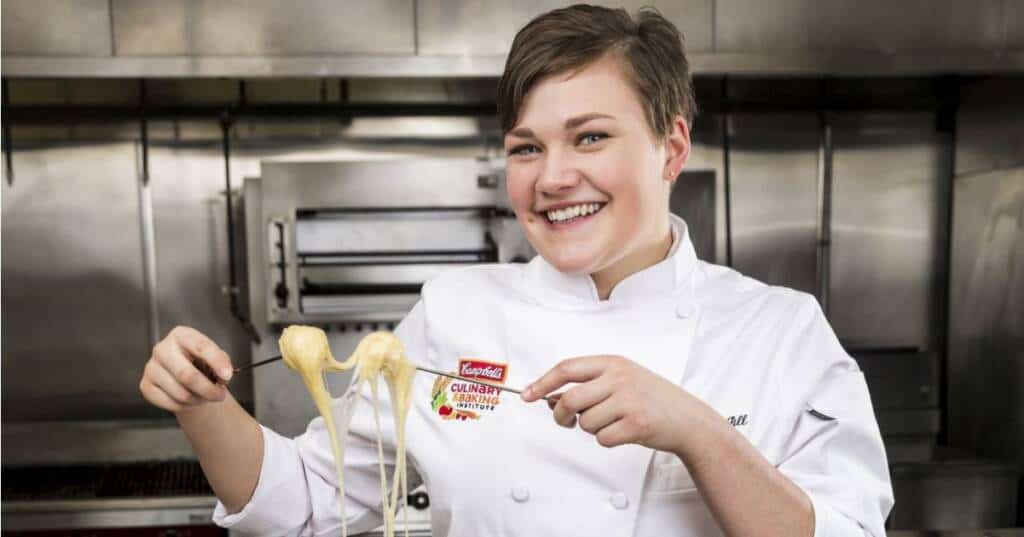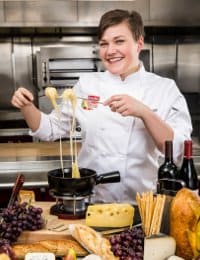
“The education I received at CIA was well-rounded and gave me the opportunity to learn the skills I needed to succeed at a food company and effectively communicate my knowledge of baking to them.”
CIA Alumni Bio
Originally from Nebraska, Kaylee Gill moved to New York to attend The Culinary Institute of America, where she earned her bachelor’s in culinary science degree in 2016. After graduation, she joined Campbell Soup Company in its research and development area. Today, Kaylee is a research chef for Pepperidge Farm, focusing on front-of-funnel innovation and product development. She explains how the CIA helped her realize that culinary science was her passion and gave her the well-rounded skills to pursue that passion as a career.
How did you come to the realization that your life would be in the food world?
I grew up in a family that loves desserts and baking. I mean, we love it. At our family events we usually have a separate table in another room set up to hold all the desserts that are brought. Though I spent most of my spare time growing up in the kitchen, I didn’t consider it as a career possibility until around the time I was a sophomore in high school. I loved learning about the science behind all the items I baked and cooked. Eventually I realized that was what truly interested me, but I wasn’t sure yet how I was going to cultivate this passion. To get a sense of whether I could handle it, I started reading every book on food and restaurant culture that I could get my hands on. I set a goal that summer to bake every single day at home, trying new recipes and building my understanding of how each ingredient involved played a role.
During my junior year I worked at a local bakery and restaurant during the week. However, they were closed on Sundays, so I volunteered to work for free that day at another bakery 30 miles away to learn whatever they could teach me. While this was going on, I realized it was something I could really see myself doing every day, and I knew I had to give it a shot.
Why did you choose the CIA?
I started researching culinary schools in the U.S., and kept hearing about the CIA. I remember seeing the Julia Child quote about the CIA, that it was “The Harvard of Culinary Schools,” and at that point I knew I had to go. I grew up in Nebraska, and when I told my parents I wanted to move to New York State, I think my mother nearly passed out. They were skeptical of the idea and were unsure about having their only daughter move across the country, but eventually they realized it was the right move for me and were fully supportive.
For a period, I was undecided as to whether I should attend a nearby university in Nebraska to obtain a food science degree and continue to cultivate my love for science, or if I should pursue my passion for baking. After thinking it over for a few weeks, I decided that I had to go to the CIA. It just seemed like the right path for me. I remember I received my acceptance letter on December 26, 2012, and shortly after that they announced that a new culinary science program was starting the following year. It was kismet. I knew the day I started at CIA that I was going to enter the culinary science program.
How did the CIA prepare you for your chosen career?

Working in the CPG (consumer packaged goods) space means I do so much more than just cook or bake. My job involves interacting with many members of the company, whether it’s marketers, scientists, or sensory professionals. The education I received at CIA was well-rounded and gave me the opportunity to learn the skills I needed to succeed at a food company and effectively communicate my knowledge of baking to them.
How did scholarships and/or grants help you reach your goal of getting a CIA education?
Internal and external scholarships played an important role in my attendance at school. They helped pay nearly half of my total tuition. Without them, I don’t know if I could have attended.
What did you like best about your CIA experience?
Being surrounded by people who love the same things that I do every day was amazing. There was such passion amongst my classmates to discuss articles or the new cookbooks we had just picked up, or to discuss a new dessert idea we were playing around with in our free time. It wasn’t uncommon to drive two and a half hours one way on the weekend to go to a brewery or bakery we had heard so much about. The desire and drive my friends and classmates had to explore cuisine in all its forms was so contagious, it helped truly foster a great learning environment.
What is the best lesson you learned while at the CIA?
I learned how to be a better collaborator and partner, whether in the kitchen, classroom, or workplace.
What class at the CIA had the most impact on you?
Chocolates and Confections during my associate program had the most impact on me, because it made me realize that culinary science was truly my passion. The precision required to properly execute the products we made was astounding. It’s confectionary chemistry at its finest. Whenever a younger baking and pastry student asked me about the cul sci program, I always said that if you loved Chef Greweling’s hourly morning lectures on topics such as sugar crystallization, wished they were longer, and yearned to learn more, you would probably also enjoy a three-hour lecture from Dean Russin on hydrocolloids at 7 a.m.
What’s your favorite part of your job?
While I loved working in restaurants and bakeries, there’s something so exciting about being able to create food that is accessible to nearly everyone. I get to work for a brand that has so much history and connection with people. I love when I tell someone I work for Pepperidge Farm—their first response is something like, “Oh my gosh, I love Farmhouse Cookies!” or “My kids love to snack on Goldfish!” or they tell me about whatever their favorite product is. The fact that people have such a connection to the brand and specific products like Milano cookies or Goldfish crackers puts a positive source of pressure on us to create the best food we possibly can.
What are some challenges that students may face in the industry?
This is very dependent on the area of the industry, but when joining the Consumer Packaged Goods segment, I was astounded by how much I still had to learn about how food companies operate. While I learned about how products are commercialized in my culinary science courses, it’s a completely different thing to be working within the system. It felt like I would never understand it all. I had to be willing to be uncomfortable and ask a lot of questions, but that openness allowed my colleagues to see that I was willing to understand their roles and that I cared about doing my job effectively.
What advice would you give to a new student or someone who is considering attending the CIA?
Take time to really consider what you want your career path to be. Coming into the CIA with a clear idea of what you want for your future self will help you know what to devote your time to. Knowing that I wanted to go into culinary science early on allowed me to make connections with those who could help me reach my goals.
How do the skills and knowledge you gained in the CIA culinary science program help you in your job?
The cul sci program taught me to be comfortable with failure, which is a necessary part of experimentation. When cooking, there tends to be very clear lines between what is right and what is wrong. In food science, the lines are blurred. It was so discouraging to work on an experiment that didn’t have the outcome I expected, but then I realized that is the point of all this. What can be a flaw in the kitchen can be useful when developing a product on the benchtop. As long as you are learning from your failures and not continuing to make the same mistakes, there’s nothing wrong with it.
What do CIA culinary science grads bring to the industry that make them really stand out to an organization?
You leave the school not just as a trained chef, but one with a deeper understanding of ingredient functionality and the ability to dive into scientific research. That’s not a combination that every job candidate has.
What really cool stuff did you do in culinary science class?
I enjoyed nearly all the experiments we did as part of the curriculum, which really helped to reinforce the concepts we were learning. As we advanced through courses we were able to tweak and personalize them, like the lesson we had using the rotary evaporator, when we got to decide what flavors we wanted to distill and use to help flavor a ganache-filled chocolate.
While this is a functioning lab with boundaries and rules, we had a lot of opportunities to flex our creative muscles and start to answer some of the culinary questions that had always perturbed us. Like, does replacing some of the water with vodka in a pie crust really make a noticeable difference in the perception of flakiness? Plus, I was able to brew beer for my senior thesis experiment. You’ve got to admit, that’s pretty cool.
